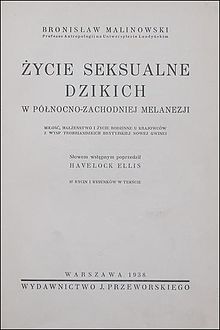The Sexual Life of Savages in North-Western Melanesia
 Cover of Polish translation of 1938 | |
| Author | Bronisław Malinowski |
|---|---|
| Original title | The Sexual Life of Savages in North-Western Melanesia. An Ethnographic Account of Courtship, Marriage, and Family Life Among the Natives of the Trobriand Islands, British New Guinea. London. |
| Translator | Życie seksualne dzikich w północno-zachodniej Melanezji |
| Language | English |
| Subject | Anthropology |
Publication date | 1929 |
| Media type | |
The Sexual Life of Savages in North-Western Melanesia (Template:Lang-pl) is a 1929 book by anthropologist Bronisław Malinowski. The work is his second in the trilogy on the Trobrianders, with the other two being Argonauts of the Western Pacific (1922) and Coral Gardens and Their Magic (1935).[1]
Summary
In the preface Malinowski says that sexuality "dominates in fact almost every aspect of culture".[2][3]
Malinowski gives a detailed description of the social organisation of sexuality (social rites, partner choice, etc.) "tracing the Trobriand lifecycle from birth through puberty, marriage, and death".[1]
Children do not submit to a system of "domestic coercion" or "regular discipline": they "enjoy considerable freedom and independence". The idea of a child being "beaten or otherwise punished in cold blood" by a parent is viewed as unnatural and immoral and when proposed by westerners (like the anthropologist) is "rejected with resentment". Things are asked "as from one equal to another; a simple command, implying the expectation of natural obedience, is never heard from parent to child in the Trobriands". The event of a person getting angry and striking another person "in an outburst of rage" sometimes happens, as often from parent to child as from child to parent.[4]
In later chapters, the parent-child relationship of the Trobrianders is described with details of their complex matrilineal relationship structure in which the biological parentage is ignored.
Based on ethnographic data, Malinowski argues that the Freudian Oedipus complex is not universal.
Scholarly reception
Malinowski's argument that the Oedipus complex is not universal has been questioned by anthropologist Melford E. Spiro in his book Oedipus in the Trobriands (1982).[5]
See also
References
- ^ a b Notes for sessions six and seven on the background and world of Malinowski by William W Kelly
- ^ Malinowski 29, p. xxiii
- ^ Herdt, Gilbert H. Guardians of the Flutes: Idioms of Masculinity
- ^ p. 52–53
- ^ Spiro, Melford E. (1982). Oedipus in the Trobriands. Chicago: The University of Chicago Press. ISBN 0-226-76989-5.
External links
- The Sexual Life of Savages in North-Western Melanesia at the Internet Archive
- Bronislaw Malinowski (1929) The Sexual Life of Savages in North-Western Melanesia Book text from Google books.
- Melford E. Spiro Oedipus Redux Ethos, Vol. 20, No. 3 (September 1992), pp. 358–376
